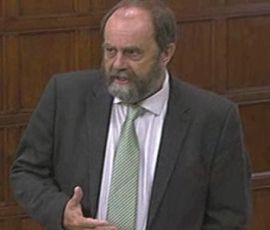DEFRA ‘will consider’ legislation on milk

Farm minister David Heath says the government will seriously consider legislation if a voluntary code fails to deliver fairer milk prices for dairy farmers.
The dairy industry voluntary code of practice on contracts was a potential momentous agreement, Mr Heath told MPs on Thursday (13 September).
Designed to oversee contracts between milk producers and dairy processors, the code could lead to more trusting relationships in the supply chain, he said.
“We can’t have warring within an industry which is mutually dependent,” said Mr Heath during a Westminster Hall debate.
Mr Heath said he was “strongly optimistic” that the code was the best way forward for securing a sustainable arrangement between farmers and processors.
But he added: “I will certainly seriously consider the possibility of making contracts compulsory if the code fails to deliver the necessary changes.”
It was therefore vital that the industry gave the code its full support and the time needed for it to take effect, Mr Heath said.
A significant number of dairy farmers would struggle to make ends meet this year.
“I will certainly seriously consider the possibility of making contracts compulsory if the code fails to deliver the necessary changes.”
David Heath, farm minister
As well as low milk prices, farmers had faced rising input costs and “monsoon conditions” this summer.
“We have to have arrangements in the dairy sector which are fair to the farmer, fair to processors, fair to retailers and fair to consumers. Those are not incompatible objectives.”
Mr Heath said it was “not my business” to tell farmers how to run their businesses.
But he added: “I think we need to look at the vast range of costs of production on dairy farms and see if we can learn from best practice.”
Mr Heath said he wanted to help farmers to recognise the difference efficiency and profitability could make and what improvements could be achieved.
“There are things dairy farmers can do on their own,” he said.
These including signing up to Dairy Pro – a new scheme to help farmers develop their skills and keep up to date with business management, animal health and welfare.
In the near future, dairy farmers would also be able to collaborate to form producer groups to market their milk collectively on their behalf.
A well-organised producer organisation could make a significant difference to farmers by sharing best practice, increasing efficiencies and opening up new markets.
“All of these things are cumulative in terms of what they can do – but I do think that collaboration within our dairy industry is something we should encourage.”
See the latest news on the milk prices crisis on our dedicated page.
